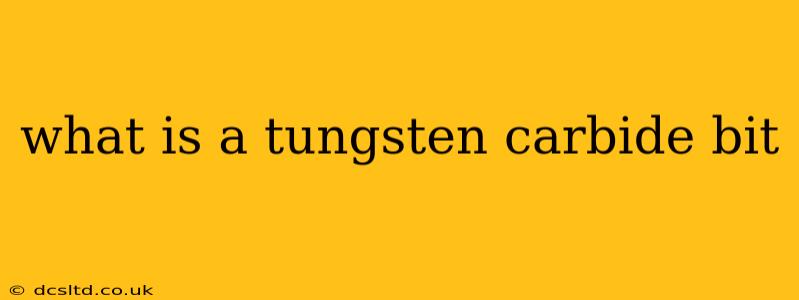Tungsten carbide bits are incredibly durable and versatile cutting tools used in a wide range of applications, from drilling through tough materials to shaping intricate designs. Their exceptional hardness and wear resistance make them a superior choice compared to traditional high-speed steel bits. But what exactly makes them so special? Let's delve into the specifics.
What Makes Tungsten Carbide Bits So Strong?
The strength of a tungsten carbide bit comes from its composition: a mixture of tungsten carbide (WC) particles bound together by a cobalt (Co) binder. The tungsten carbide provides the extreme hardness, enabling the bit to cut through incredibly resistant materials. The cobalt binder acts as a cement, holding the carbide particles together while also influencing the bit's toughness and wear resistance. The precise ratio of tungsten carbide to cobalt can be adjusted to tailor the bit's properties for specific applications. A higher cobalt content generally results in a tougher, but slightly less hard, bit.
What are Tungsten Carbide Bits Used For?
The applications for tungsten carbide bits are vast and span numerous industries. Their exceptional performance makes them ideal for:
- Drilling: They excel at drilling through hard materials like steel, granite, and concrete, where standard bits would quickly wear down.
- Milling: Tungsten carbide milling bits are used to create precise cuts and shapes in a variety of materials, from metals to plastics.
- Routing: In woodworking, carbide router bits are essential for intricate detailing and clean, precise cuts.
- Engraving: Smaller, specialized tungsten carbide bits are used for fine engraving work on metal, glass, and stone.
- Machining: In industrial machining, tungsten carbide bits are crucial for high-precision operations, maintaining accuracy and longevity even under heavy loads.
What are the Different Types of Tungsten Carbide Bits?
The design and geometry of tungsten carbide bits vary greatly depending on their intended use. Some common types include:
- Drill bits: These range from simple twist drills to more complex designs for specific materials and applications.
- Milling cutters: These come in various configurations, including end mills, face mills, and ball nose mills, each suited to different milling operations.
- Router bits: These are designed for woodworking, with profiles ranging from straight bits to intricate decorative patterns.
- Reamer bits: Used to enlarge existing holes to precise dimensions.
How Long Do Tungsten Carbide Bits Last?
The lifespan of a tungsten carbide bit depends heavily on the material being worked, the cutting conditions (speed, feed rate, coolant use), and the quality of the bit itself. However, generally speaking, tungsten carbide bits significantly outlast high-speed steel bits, offering considerably more cutting time before requiring replacement. Proper maintenance, including avoiding overloading and using appropriate cutting fluids, can further extend their lifespan.
What are the Advantages of Using Tungsten Carbide Bits?
- Exceptional Hardness and Wear Resistance: Their superior hardness allows them to cut through extremely tough materials.
- Increased Durability and Longevity: They last much longer than conventional bits, saving time and money in the long run.
- Precision and Accuracy: They allow for precise cutting and shaping, crucial for many applications.
- Versatility: They can be used on a wide range of materials and in diverse applications.
What are the Disadvantages of Using Tungsten Carbide Bits?
- Higher Cost: Tungsten carbide bits are generally more expensive than high-speed steel bits.
- Brittleness: While incredibly hard, they can be brittle and prone to chipping if subjected to excessive impact or improper use.
- Requires Proper Maintenance: To maximize their lifespan, they require proper use and maintenance.
Are Tungsten Carbide Bits Recyclable?
Yes, tungsten carbide is a valuable material and can be recycled. Many manufacturers have programs for collecting and recycling used tungsten carbide bits, contributing to sustainable manufacturing practices. Check with your supplier to see if they offer a recycling program.
This comprehensive overview should provide a solid understanding of tungsten carbide bits, their properties, applications, and advantages. Remember to always select the appropriate bit for the task and follow safe operating procedures.
